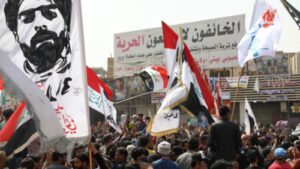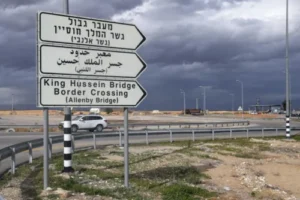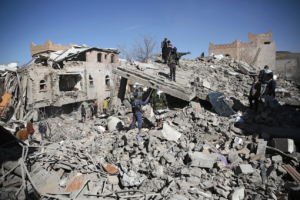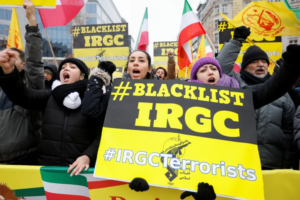
The National Interest Foundation Newsletter
Issue 176, January 26, 2023
Welcome to our NIF Newsletter. In this week’s headlines: we investigate growing unrest in Egypt as worsening financial turmoil begins to take its toll, we analyze the new rules Israel has implemented for people traveling to and from Palestine and how it will impact the West Bank, explore why Saudi Arabia continues to shell areas in Yemen despite peace talks, and take a look at the newly passed EU sanctions against Iran.
Arab Spring 2.0?

As economic stability worsens in Egypt, protests are likely to become more widespread. (Photo from AFP)
Is Egypt on the Verge of Another Arab Spring?
Egyptian President Abdel Fattah el-Sisi currently stands amid an economic crisis never seen before in Egypt. Currently, with the pound devaluing to an exchange rate of 29 pounds to 1 U.S. dollar and decreasing, Egypt is slowly running out of resources. The Gulf leaders that once supported Egypt are slowly losing faith, discontinuing much of their economic aid. Economic mismanagement is not a new trait for Egypt. Rather than spending cash influxes on education, healthcare, affordable housing, or revenue-generating projects, they chose to spend billions fueling Egypt’s military economy through their roadways, a monorail, presidential palaces, and luxury hotels, even last year purchasing a $500 million-dollar jumbo jet for President el-Sisi himself. These acts of poor leadership and decision-making are leading to distrust in President el-Sisi from the Egyptian citizens as the poverty level is increasing rapidly, with little change or acknowledgment of the fact. These instances have been seen before, and we have seen what these indicators can lead to. The first Arab Spring began as the consequence of evident corruption in government and stagnation, in some cases decline, in the economy.
12 years ago on January 25th, the result of dissatisfaction with the rule of government led to an event we all know as the Arab Spring. Egypt’s participation in the string of revolts began during the 18-day national uprising leading to the removal of a 30-year dictator Hosni Mubarak. Years of fair and clean elections followed this uprising and Mohamed Morsi was the first-ever civilian president. The military leaders of Egypt did not agree with Morsi’s democratic policies and orchestrated a 2013 coup d’état. The coup was led by Abdel Fattah el-Sisi, who was Morsi’s defense minister, promised economic prosperity and transitioned to national authoritarianism. The coup was financed by dictatorships in the Gulf. El-Sisi received tens of billions in grants from the United Arab Emirates and Saudia Arabia as well as large loans from UAE, IMF, the World Bank, China, and more. In 2016 construction amounted to over $50 billion to enhance a capital city with the building projects primarily serving wealthy Egyptian elites. Average citizens have been getting extreme subsidy cuts and are left without the ability to meet their basic needs. Inflation quickly increased under el-Sisi’s rule reaching up to 22% and the debt of Egypt tripled to $160 billion. El-Sisi gave multiple speeches calling on “brothers (in the Gulf)” for further financial aid. These pleas for more funding fell upon deaf ears. This prompted the Egyptian president to call into question their alliances with the Gulf states, who were tired of pumping money into Egypt without any positive results. To get back in good economic standing President Sisi allowed the UAE to start buying state-owned Egyptian assets, like corporations and banks, in trade for substantial grants and loans. In the past, he has commanded his citizens: “Do not listen to anyone but me.” This rhetoric clearly displays el-Sisi has grown concerned about the rising complaints of poverty in the country. In many of his recent speeches, he tells people to stop complaining with “empty talk” about the ongoing problems they are facing.
There is a high degree of civil unrest, distrust from the actors in the Gulf, and economic devastation in Egypt. President el-Sisi has displayed poor leadership and decision-making. This mismanagement has caused untold suffering. As there continues to be isolation from other actors, corruption within the government, and economic stagnation, the people’s discontent will grow. In efforts to control the country, the government has utilized torture, targeted arrests, and repression of civil societies. The president’s recent remarks about the Arab Spring have been increasingly critical, indicating that he is aware of the precarious position he finds himself in. There is a clear route forward for el-Sisi. This would involve him allocating resources toward education, healthcare, and other institutions that will improve the quality of life for all Egyptians. Deeply entrenched corruption does not make this likely, but if policies similar to this are not implemented, el-Sisi may suffer the same fate as his predecessor.
New Israeli Rules Isolate West Bank

Newly implemented rules will continue to isolate Palestinians in the West Bank. (Photo from AFP)
New Entry Rules Will Further Isolate Palestinians in the West Bank
Israel has implemented a new set of restrictions that continue to rob the Palestinians of their human rights. The Palestinian people face further isolation as more restrictions are placed on the West Bank by the Israeli government. Israel has implemented a policy that fragments Palestinians across multiple isolated pockets of land. These new policies are purposefully designed to weaken the connection that the community can create socially, culturally, and intellectually. The laws impose heavy restrictions on the resident conditions of foreigners, affecting the ability of humanitarian actors to work in the West Bank. Human Rights Watch has warned Israel that these targeted policies of isolation will only further isolate Palestinians and deter development. The effects of these new restrictions are already evident. At Bethlehem University, one of the school’s programs consists of 70% foreign staff and students. They are fearing significant losses in enrolment and a decrease in the number of educational programs they can offer due to these new restrictions. A graduate student born in Europe with a Palestinian father and European mother has also been denied an ID card under the new rules, even though his family has lived there for 3 generations. An HRW Middle East director disclosed that Israel is “making it harder for people to spend time in the West Bank” and is “taking yet another step toward turning the West Bank into another Gaza, where 2 million Palestinians have lived virtually sealed off from the outside world for over 15 years.” This is a targeted effort from the Israeli government to weaken the Palestinian developmental ties with the rest of the world.
There have been clear examples of Israel using tools of colonialism and repression to isolate the Palestinian people. Since its occupation of the West Bank began in 1967, Israel has forcibly evicted and displaced entire communities and demolished more than 50,000 Palestinian homes and structures, according to Amnesty International. Much of the West Bank is under Israeli rule. This has already stifled opportunities for the Palestinian people to grow and sustain academic, cultural, and social connections with one another and the outside world. Israeli restrictions have increased from a 3-page long document to a staggering 61 pages. These new rules are a violation of the freedom of movement and will greatly stifle economic and academic activity in Palestine. Israel has imposed a system of checkpoints, roadblocks, and barriers that make it difficult for Palestinian students, faculty, and researchers to travel within the West Bank and to access universities and research institutions outside of the West Bank. It also limits Palestinian students’ ability to attend classes and collaborate with academics outside of Palestine. Import restrictions on books and other resources further complicate any attempt to conduct research and provide education. Israel has also imposed restrictions on the movement of goods and people, which has made it hard for Palestinian businesses to combat high levels of unemployment in the West Bank.
These actions in the West Bank by Israel echo strategies used by colonial powers in the past. The goal of these new policies is to control, divide, and dominate the Palestinian people. The policies and practices implemented by the Israeli government intend to seize control over the land and resources of the West Bank, and in tandem, limit Palestine’s ability to govern and grow. Being stripped of access to education, healthcare, and economic opportunities clearly demonstrates the intent of hindering growth in Palestine. Israel is trying to take over Palestinian land, water, and other resources, and give them to the Israeli settlers at the expense of the people who have lived there for generations. These inhumane acts administered by the Israeli government are egregiously impacting the well-being of Palestinians, isolating them from development socially, culturally, and intellectually, and are clearly an effort to continue to force Palestinians from their homes. Israel needs to reverse the policies as they are cruel and an obvious attempt to displace, incapacitate, and control more of the Palestinian population.
Saudi Arabia Shells Yemen

The unnecessary destruction by the Saudis will only lead to more death and destruction and could harm the peace process. (Photo from AP)
Saudi Arabia Renews Its Shelling of Yemen Despite Ongoing Talks of an Armistice
Saudi Arabia continues to launch artillery attacks, resulting in civilian casualties, despite ongoing talks between themselves and the Houthis. Yemen has already suffered through eight years of brutal war that has resulted in more than 150,000 casualties due to the fighting. The war has crippled Yemen’s economy, starved its people, and devastated families. Saudi Arabia and Yemen have been in recent talks of an armistice since their previous agreement expired in October. The two sides hoped to make the currently unofficially agreed upon ceasefire stronger in efforts to build toward an end to this bloody civil war. Amidst these talks, two civilians were recently killed in the Shada’a District located north of Yemen. In this area, there has been consistent shelling for weeks, according to reports from the ground. The Yemeni Ministry of Health (YMH) in the Sanaa government has disclosed that 3,258 civilians have been killed and injured during the shelling in the Shada’a district. In a report released in late 2022, the YMH uncovered the Saudi-led coalition was purposefully targeting civilians in the bordered areas of Saada Governorate, using artillery shelling and machine guns. Concerns of war crimes by Saudi forces are being reported from practices of electrocution, use of acid, and other torture mechanisms on Yemeni victims, according to human rights organizations. Just at the beginning of this month, 8 civilians were killed by missile strikes and shelling at the hand of the Saudi-led coalition.
This war began when the Houthis (an Islamist political, militant movement emerging from Saada Governorate in northern Yemen in the 1990s) descended from northern Yemen and seized the capital of Sanaa in 2014, forcing the government in the south into exile in Saudi Arabia. In 2015, Saudi Arabia joined in this Yemeni Civil War along with the UAE, other Arab nations, and support from the United States, all in response to the calls from Yemeni President Abdrabbuh Muansur Hadi for military support after being ousted by the Houthi movement. The Houthis currently maintain a strong grasp over the north and much of the west. The war has spilled into Saudi Arabia and the UAE with missiles and drone attacks from the Houthis.
Talks between Houthi and Saudi leaders were sporadic starting in 2019 until the U.N. intervened with a more formal truce in April 2022. This truce halted full-on war but has since expired. All sides have grown weary from the fighting; however, it is very difficult to procure a resolution to a conflict that involves so many parties. Recently there have been conversations between the Houthis and Saudi Arabia’s diplomats to find a solution to the conflict. The Houthis demand that the coalition pay salaries to all state employees from oil and gas revenues and open airports and ports under Houthi control. The Saudi diplomats are against paying military salaries unless Houthis accepted security guarantees that include Houthi areas that line the Yemen-Saudi border to be turned into buffer zones. Saudi diplomats also asked for the Houthis to join official talks with other Yemeni stakeholders. These talks continue as the Saudi diplomat says they are working toward solutions that are “more satisfactory for all sides.” The continued attacks on Yemen during negotiations only hurt peace prospects and result in the death of more civilians. It is also important that those guilty of the inhumane treatment of Yemenis are brought to justice. This will allow the country to begin to heal as they move forward.
More EU Sanctions Levied Against Iran

It remains to be seen if the EU will classify the IRGC as a terrorist organization. (Photo from Reuters)
The European Union Issues New Sanctions on Iran, Stops Short of Labeling the Iranian Revolutionary Guard Corps a Terrorist Organization
On Monday, January 23, the European Union (EU) agreed to impose a new package of sanctions against Iran. These sanctions are targeted at those that are “directing the repression,” according to the President of the EU, Ursula von der Leyen. Peaceful anti-government protestors in Iran have been brutally repressed by Iranian authorities with punishments that are disproportionate to their alleged crimes, provoking further sanctions. 37 entries will be inserted into this package that will be presented in their next meeting. The senior officials of the Islamic Revolutionary Guard Corps (IRGC) are being specifically targeted. Though some from the EU want the whole group added to the list of terrorist organizations, it could only happen if all countries in the EU deemed the IRGC guilty of terrorism. The sanction targets 18 individuals and 19 entities. Those targeted incur travel bans into the EU, frozen assets, and prohibition from transferring funds or economic resources. A ban also exists on exports of equipment to Iran that could be deemed useful toward their internal repression, including certain media equipment that is being used to control and manipulate the people in Iran. Along with the sanctions, the EU also condemned Tehran’s response to the country’s ongoing protests. The Iranian foreign minister, Hossein Amirabdollahian, has said that the United States is actively attempting to reopen dialogue to reestablish negotiations over the Joint Comprehensive Plan of Action (JCPOA). “The Americans found out sooner than the E3 (France, Germany, and the United Kingdom) that there is nothing behind the riots in Iran. They sent a message sooner and insisted on returning to the JCPOA,” Amirabdollahian said, in line with Tehran’s repeated stance that the West has been behind the country’s unrest. The United States maintains that talks are not a priority. The EU and Tehran had previous conversations in efforts to re-establish the JCPOA, but the appalling treatment of Iranian protestors has sent those talks into serious decline.
The IRGC began in 1979 during the Islamic Revolution to provide a defense to the Shi’ite ruling system. They have a strong army of 125,000 ground, naval, and air units amongst them. The IRGC has been a main tool of Iran’s government in the suppression and brutalization of its people. They are currently being heavily utilized to crush any protests in the country. Iran has warned that designation of the IRGC as a terrorist organization would harm EU security. The IRGC is recognized as a terrorist organization by the United States.
These sanctions on Iran could have some serious negative implications on their economy. As a consequence of their treatment of their citizens, Iran faces limitations on the country’s ability to trade with other nations. Restrictions on exports to Iran coupled with the difficulty to access financial markets limit resources and put a strain on the Iranian economy. This also limits the resources Iran has at their disposal to suppress the protests. Businesses within the country will be impacted. It will become increasingly difficult to operate a business as the country faces more restrictions and sanctions, putting jobs in jeopardy. Quality of life will likely plummet as well. What started as a protest of the death of Mahsa Amini has transformed into large-scale protests that demand societal change, with the people of Iran fighting for more equality for women and increases in opportunity and representative leadership. The world must remain vigilant and continue to support the protests in Iran.
